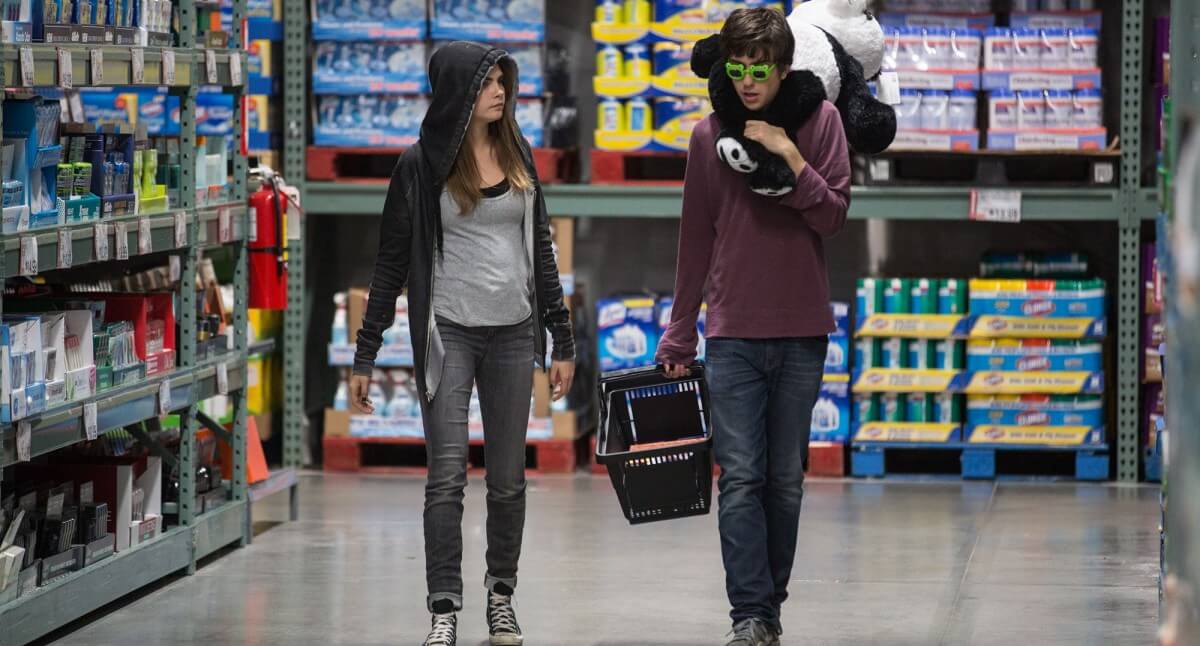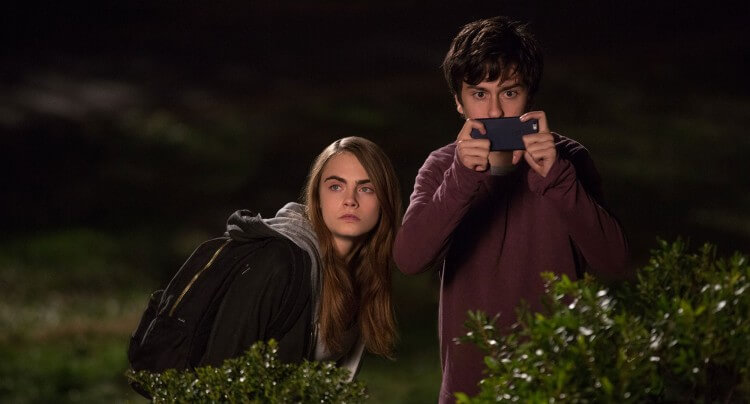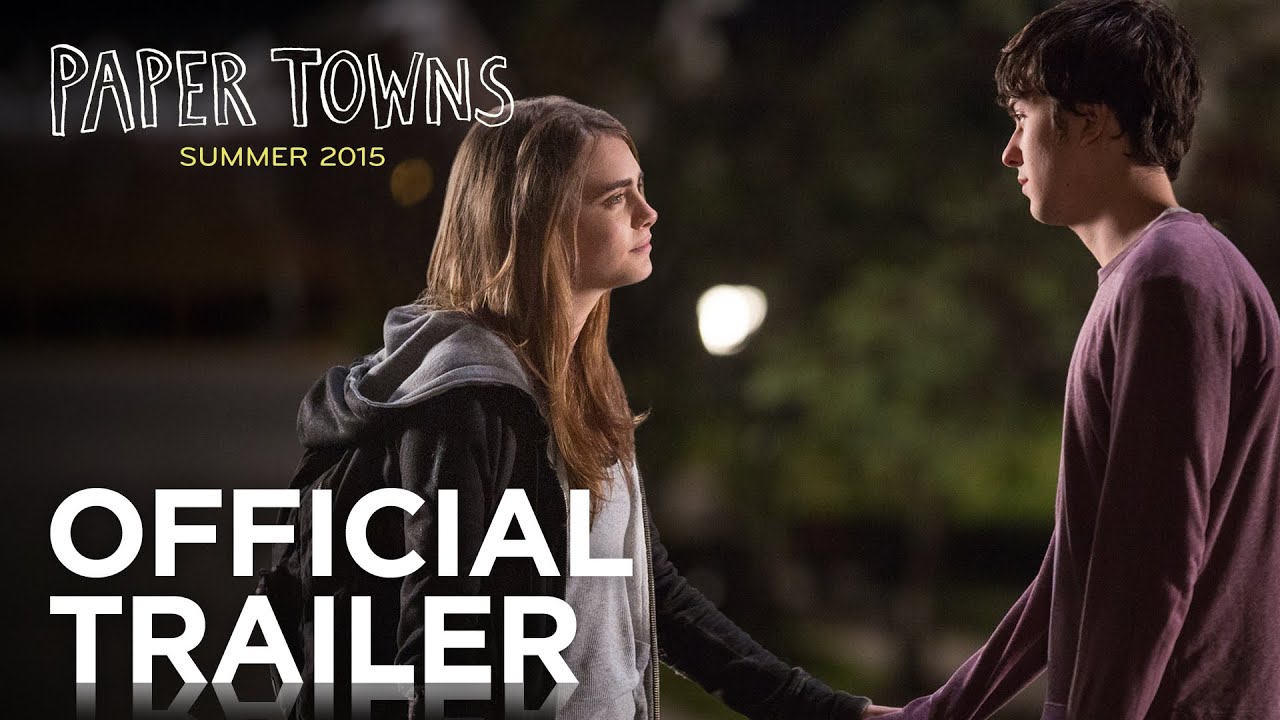Paper Towns is movie that very much wants to be the next teen mega hit. The story is incredibly straight forward, along with the characters you meet in this 109-minute journey. In a time where dystopian movies have flooded the box offices, Paper Towns seeks to bring a grounded sense of realism that most teen movies avoid. While this is the second of John Green’s wildly popular books to receive a film adaptation, the first being the smash hit The Fault in Our Stars, it sadly doesn’t reach the aspirations it so hopefully grasps for.
To be clear however, this review will not be based on the changes made from the book; as vast and odd as they might seem to those who have read it. I will be looking at the movie as a stand-alone entity, disregarding the book. With that being said let’s get into it.
—————— Warning Spoilers Ahead!! ———————–
Following the story of high school senior Quentin (Nat Wolff) on a journey to find the love of his life Margo (Cara Delevingne) after she mysteriously disappears a few days prior to the end of their senior year of high school. What follows is a trip where Quentin, his two best friends Ben (Austin Abrams) and Radar (Justice Smith) attempt to figure out Margo’s whereabouts. Along for the ride are the love interests for Quentin’s bff’s Lacey (Halston Sage) and Angela (Jaz Sinclair) who lack a certain complexity that is desperately needed. Unlike Ben and Radar, the girls in this film always appear to be under developed, to the point where we know little about them at all. While there could be a message about the simple construct and assumptions we make about other people, it’s never developed in a deeper way that pays off in the end.
The message that director Jake Schreier tries to convey is incredibly on-the-nose, to the point where I was expecting the characters to look at the audience and literally tell them the meaning behind it all. It’s a film that doesn’t want to trust its audience with the ability to figure out these important themes on their own. Instead, it chooses to handhold us throughout the entirety of the film. Margo’s “cool girl” persona is fun and to a certain point relatable. We all had that one kid in high school that seemed to be more myth then person. Yet Margo never has a subtle approach to her story arc or dialogue; with most of her lines coming off as incredibly heavy handed. She appears less of a principle character than just a walking, talking theme for the entirety of Paper Towns’ story. Margo acts as nothing more then a plot device to push the primary story forward, lacking in anything resembling a fulfilling closure.
The story itself also seems divided, wavering between foreboding teen mystery and wacky road trip; with the former getting a lot of development and the latter feeling rushed. This plays into a drastic tonal shift that Paper Towns suffers from. Despite the fact that the boys never really encounter any perils, the primary 2/3rds of this film come off like a detective novel from the 90’s. Its pacing always seems disjointed; as if the director mashed two popular teen genre’s together in the hopes that they would stick. It’s once Paper Towns kicks into its last act that the film begins to stride confidently. The road trip, while not uncommon ground for a movie, is incredibly fun and lovable. Made more so thanks to the hilarious performances from the three boys and their relationships with each other.
Ben and Radar make up the majority of Paper Towns biggest laughs and best moments. Both characters step away from the geeky stigmas we would usually label them as, adding depth and believability to their performances. Their relationship with Quentin is a more successful narrative theme; despite it having little in the way of surprising twists or turns. It’s incredibly straight forward, but the charm and chemistry all three actors bring to their characters makes it far more believable. Truthfully I found myself far more interested in Ben and Radar, then anything involving finding Margo.
The humor in Paper Towns is also a notable point, as it doesn’t just cater to the teens of today. Its humor isn’t weighed down by pop culture reference, after pop culture reference in an attempt to relate it to the audience. The jokes are witty and far subtler; playing off the idea of what a group of teen boys might joke about. They never take center stage, yet during most of the three boys interactions I couldn’t help but grin. Our female companions do get a few good jabs here and there, but actors Abrams and Smith outshine them in every scene. Which is a shame, because the acting from their respective love interests was just as good.
Cinematography is what you’d expect from a teen film like this, nothing jaw dropping but nothing awful either. The editing is smooth and the camera work is handled competently, always trying to keep the story from dragging. The soundtrack is fine, but doesn’t offer any memorable moments that will stick with you if that song comes on the radio. I should make this clear; Paper Towns is a fine movie and was an enjoyable time. The laughs are there and if you can look past a lot of the heavy handed story telling it has a lot of heart. Not a film to be remembered through the ages, but serves as an enjoyable summer romp.
[gap height=”15″]
[review]









